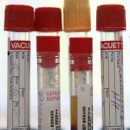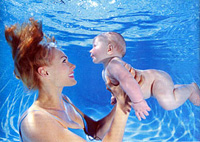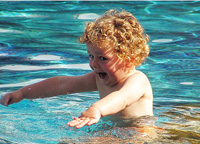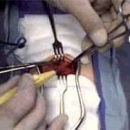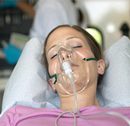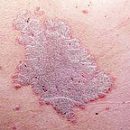Anaphylactic shock is an absolutely urgent state, the development of which can lead to death.
Content
Anaphylactic shock
Anaphylactic shock - an allergic reaction that occurs when a substance caused by allergies. This is one of the most severe manifestations of allergies, by the speed of development and gravity, it has no equal.
Causes of anaphylactic shock
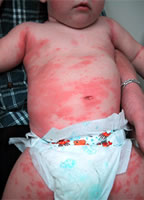 Anaphylactic shock can develop when administered to the body of drugs, the use of x-rays of radiation substances. In very rare cases, a shock state can be as a manifestation of food allergies or as a reaction to insect bites. Cases of the development of anaphylactic shock from the effects of cold are described. As for drugs, almost any of them can cause anaphylactic shock. Most often, such a reaction appears on antibiotics, especially Penicillin.
Anaphylactic shock can develop when administered to the body of drugs, the use of x-rays of radiation substances. In very rare cases, a shock state can be as a manifestation of food allergies or as a reaction to insect bites. Cases of the development of anaphylactic shock from the effects of cold are described. As for drugs, almost any of them can cause anaphylactic shock. Most often, such a reaction appears on antibiotics, especially Penicillin.
In children, the cause of an anaphylactic reaction can be the introduction of vaccines, sera. More often shock develops with a reuse of a medication or allergen. But health workers or children, whose mother, during pregnancy and breastfeeding, received this drug, anaphylactic shock may occur at the first contact with the drug. The method of administration and dose of allergen does not play roles for the development of shock in a sensitized (allergized) person.
Anaphylactic shock in food allergies Relative rarity. In pediatric practice, such cases are in the intolerance of milk (sensitization to beta-lactoglobulin), fish, egg protein.
The mechanism of development of anaphylactic shock
The development of the clinical picture of anaphylactic shock is an allergic reaction. The first contact with the allergen leads to the formation of an elevated protein concentration in the IGE. When injections, anaphylactic shock is observed more often and proceeds. Especially dangerous intravenous administration of the drug, in which anaphylactic shock may occur immediately («At the tip of the needle»). Typically, anaphylactic shock occurs for 1 hour, and with rectal (through the rear pass), exterior skin and oral (through the mouth) use of the drug after 1-3 hours (as allergen suction). As a rule, anaphylactic shock flows the hardest, the less time passed from the moment of the introduction of allergen to the development of the reaction. The frequency of cases of anaphylactic shock and its severity increases with age.
Manifestations of anaphylactic shock
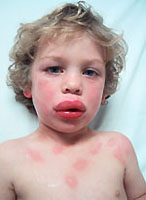 The first symptoms of the old anaphylactic shock are anxiety, a feeling of fear, pulsating headache, numbness of lips and face, dizziness, noise in the ears, cold sweat, loss of consciousness. In some cases, there is a sharply pronounced skin itch, followed by an edema of quinque or urticaria. A shortness of breath appears, a sense of constraint in the chest (a consequence of the spasm of the bronchi or allergic sandwood of the larynx), as well as the symptoms of the disturbance of the gastrointestinal tract in the form of an approached pain in the abdomen, nausea, vomiting, diarrhea. The following phenomena are also possible: foam of mouth, convulsions, involuntary urination and defecation (stool), bleeding from the vagina. Reduced blood pressure, pulse thread. In cases of anaphylactic shock, which occurs with the loss of consciousness, the patient may die within 5-30 minutes from suffocation or after 24-48 hours and more in connection with severe irreversible changes in vital organs. Sometimes a deadly outcome can occur and much later due to changes in the kidneys (glomerulonephritis), in the gastrointestinal tract (intestinal bleeding), in the heart (myocarditis), in the brain (swelling, hemorrhage) and other organs. Often with shock there are two-phase: after some improvement in the condition, blood pressure decreases again. Therefore, patients undergoing anaphylactic shock must be in hospital at least 12 days.
The first symptoms of the old anaphylactic shock are anxiety, a feeling of fear, pulsating headache, numbness of lips and face, dizziness, noise in the ears, cold sweat, loss of consciousness. In some cases, there is a sharply pronounced skin itch, followed by an edema of quinque or urticaria. A shortness of breath appears, a sense of constraint in the chest (a consequence of the spasm of the bronchi or allergic sandwood of the larynx), as well as the symptoms of the disturbance of the gastrointestinal tract in the form of an approached pain in the abdomen, nausea, vomiting, diarrhea. The following phenomena are also possible: foam of mouth, convulsions, involuntary urination and defecation (stool), bleeding from the vagina. Reduced blood pressure, pulse thread. In cases of anaphylactic shock, which occurs with the loss of consciousness, the patient may die within 5-30 minutes from suffocation or after 24-48 hours and more in connection with severe irreversible changes in vital organs. Sometimes a deadly outcome can occur and much later due to changes in the kidneys (glomerulonephritis), in the gastrointestinal tract (intestinal bleeding), in the heart (myocarditis), in the brain (swelling, hemorrhage) and other organs. Often with shock there are two-phase: after some improvement in the condition, blood pressure decreases again. Therefore, patients undergoing anaphylactic shock must be in hospital at least 12 days.
Sometimes patients who have overwhelmed anaphylactic shocks, when questioning, they say that certain allergy symptoms (itching, glooming, dizziness, temperature increase) were noticed before contacting with a substance that caused a shock reaction. These manifestations call symptoms «Anxiety».
Treatment of anaphylactic shock
Urgent help should be reasons immediately since the appearance of the first clinical signs of anaphylactic shock. The first urgent event is to stop the introduction of the drug or restricting its receipt to the bloodstream (applying the harness above the injection site or bite). Adrenaline is introduced into the place of injection or bite and you need to impose cold on this zone. Immediately introduce hormones of adrenal cortex (prednisone, dexazone, hydrocortisone). To assist patients in each medical institution there are special anti-shock sets. The life of a person depends on the elimination of shock manifestations. If the shock developed in nature or in removal from the medical center, the child must be laid with a slightly lowered head for improving blood flow. Watch that there is no inhalation of the vomites - you need to keep the head of the side and fix the language if it is. You should warm the victim, provide him with fresh air access.
Prevention of anaphylactic shock
Predict the development of anaphylactic shock is still very difficult. When reactions to Penicillin, antibiotics from a group of semi-synthetic penicillins and cephalosporins cannot be prescribed, as they have related chemical components. Introduction of lures and doctors to children with hereditaryly due to allergies should be carried out very carefully, introducing one new product in 5-7 days.
With cold allergies, bathing in cool water bodies is not recommended. These children are contraindicated long stay in the air in winter.
Prevention of anaphylactic shock from insect bites is a ban being located near the apiary, among flowering plants. Windows in the apartment where a child lives with such a type of allergies, be sure to be tightened with a grid or install a special mosquito net.
If your family has children or adults, inclined to such allergic reactions, then disposable syringes and anti-deposit medicines must be in their home and road first aid kit, appointments to provide emergency care and doses of drugs to provide first emergency care. Such recommendations can be obtained from a pediatrician or an allergist who have a child.

